Drug and Alcohol Rehab in East Yorkshire
Quick links for drug and alcohol rehab in East Yorkshire
- What is Drug and Alcohol Rehab in Yorkshire Like?
- Holding an Intervention for Drug and Alcohol Rehab in East Yorkshire
- NHS vs Private Drug and Alcohol Rehab in East Yorkshire
- How Much Does Private Drug and Alcohol Rehab in East Yorkshire Cost?
- How Long Does Drug and Alcohol Rehab Last in East Yorkshire?
- Inpatient vs Outpatient Drug and Alcohol Rehab Treatment in East Yorkshire
- Dual Diagnosis at Drug and Alcohol Rehab in East Yorkshire
- What Therapy Will I Receive at a Drug and Alcohol Rehab in East Yorkshire?
- Relapse Prevention and Aftercare After Drug and Alcohol Rehab in East Yorkshire
- Alternative Help for Drug and Alcohol Addiction in East Yorkshire
This article will discuss drug and alcohol rehab in East Yorkshire.
East Yorkshire is home to 600,259 people. Famous for its beautiful countryside, it is often considered one of the nicest places to live in the UK.
Unfortunately, it is also home to people that are struggling with drug and alcohol addiction.
According to the latest data collected by National Statistics, [1] 275,896 adults in England engaged with drug and alcohol services in 2021.
Opiates accounted for the highest number of treatment entrants (140,863), followed by alcohol (76,740). In East Yorkshire, there were recorded to be 2,759 adults (16–64) deemed to be alcohol dependent.
21,308 adults entered treatment for opiate and crack use in England, with 2,298 from East Yorkshire.
Both cocaine and cannabis remained popular substances, with cocaine accounting for 19,209 entrants and cannabis accounting for 27,304.
For more information regarding drug and alcohol statistics in East Yorkshire, please click here.
It is also worth considering the rate of drug and alcohol crime statistics in East Yorkshire, which help to display the full impact of addiction in these communities:
| Drug and Alcohol Crime Statistics in East Yorkshire (2022-2023) | Numbers |
|---|---|
| Annual Crime Rate in East Yorkshire | 1.1 crimes per 1,000 workday people |
| Compared to National Crime Rate | 42% |
| Percentage of Crimes Related to Drugs and Alcohol in East Yorkshire | 1.0% |
| Total Number of Drug and Alcohol Crimes in East Yorkshire (2022-2023) | 635 |
| Percentage Change in Drug and Alcohol Crimes in East Yorkshire | -9% |
| Drug and Alcohol Crime Rate in East Yorkshire | 1.1 crimes per 1,000 working people per annum |
| County Ranking (Crime Rate) | 6th out of 54 |
For those based in East Yorkshire and looking for help to overcome their addiction, this article will discuss what treatment is available, how to access it, and what to expect from drug and alcohol treatment in East Yorkshire.
You can read more about the disease of addiction here.
Beat your addiction with the help of a drug and alcohol rehab centre in East Yorkshire by calling us today on 0800 140 4690
What is Alcohol Addiction?

Patient and therapist talking together at a drug and alcohol rehab clinic in East Yorkshire
The National Institute on Alcohol Abuse and Alcoholism define alcohol addiction as an inability to stop or control alcohol consumption regardless of negative social, occupational, or health consequences. [2]
Alcohol addiction, or Alcohol Use Disorder (AUD), is a brain disorder and covers a broad spectrum ranging from mild to severe.
The NHS classes heavy drinking as having more than 14 units per week.
Some factors that increase the risk of AUD include:
- Starting drinking at an early age – people that begin drinking before turning 15 are five times more likely to develop AUD.
- Hereditability – studies have found that people that have been born into a family with a history of AUD are more likely to develop AUD themselves.
- Environment – being around people that drink regularly, whether family or friends, can increase the likelihood of AUD.
- Mental health issues – studies have found that mental health issues such as anxiety and depression can lead to drinking as a coping mechanism, which, in turn, increases the chances of AUD.
- Trauma – people suffering from past trauma or Post Traumatic Stress Disorder (PTSD) often use alcohol as a coping mechanism.
It is not always evident that AUD has emerged.
Alcohol addiction is unfortunately common though, with a study by Robin Room, Thomas Babor and Jürgen Rehm revealing that ‘4% of the global burden of disease is attributable to alcohol’, accounting for almost as much death and disability as tobacco and high blood pressure (hypertension) globally.
Therefore, some common symptoms include the inability to stop drinking, drinking more than usual, being unable to think about anything other than drinking, and continuing to drink regardless of negative impacts, such as social or health.
When you suddenly stop drinking after drinking alcohol for a prolonged period of time, your body begins a life-threatening process of alcohol withdrawal.
Librium is used as the first drug to help you with your medical detox, but another medication used to stop drinking is Acamprosate (Campral®), which helps rebalance the chemicals in the brain that have been damaged by alcohol.
Alcoholism can also cause anxiety and depression, which means you might be able to get prescribed medications such as an antidepressant like nefazodone, desipramine, or imipramine.
The opioid antagonist Naltrexone can also be helpful in cutting alcohol out of your life as it decreases the alcohol you consume.
You might find that recognizing you have a drinking problem is the first step to recovery.
As for your body’s recovery after drinking alcohol, damaged organs may regain function partially or heal altogether, depending on your state and whether you’ve had a relapse.
It is incredibly important to begin your recovery now, as being an alcoholic is thought to drastically lower your age of death. The average age of death for an alcoholic is 47–53 years in men and 50–58 years in women.
It is reported that about 14% of alcoholics develop liver cirrhosis if they continue their drinking habits for over a period of 8 years.
Overcome addiction with the help of a drug and alcohol rehab in East Yorkshire – call our expert team today on 0800 140 4690
What is Drug and Alcohol Rehab in Yorkshire Like?

Outdoor photo of a luxury drug and alcohol rehab in East Yorkshire
Professionally supported drug and alcohol rehab is one of the best ways to recover from addiction.
Rehab is a term used to describe a facility that specialises in rehabilitation and restoring someone to full health through evidenced-based therapy.
Rehab can cover a wide range of issues, such as rehabilitation of prisoners, health issues, or addiction.
With regards to addiction, rehab is designed to help people detox and overcome their substance dependency.
It provides a safe environment where people can address their substance-related issues.
This is achieved by implementing well-researched medical assistance and therapy. Although rehabs that specialise in addiction can vary, most adhere to a three-stage process: detoxification, treatment and aftercare.
The detoxification stage refers to the substance leaving the person’s system.
This usually leads to withdrawal symptoms, which can be unpleasant.
Depending upon the substance, people might need medical assistance – this is where rehab can be useful.
During the alcohol or drug detox stage, people will be looked after and receive any medication deemed necessary.
The second stage – rehabilitation – focuses on helping people heal from their past and deal with the issues that led to their addiction. This includes attending counselling and therapy sessions but also engaging with peers and holistic activities.
The final stage is aftercare. Most rehabs want to support people when they re-enter their old environments. To achieve this, people will be offered post-rehab care and one-to-one and peer support.
Detox, therapy, and aftercare will be covered in more detail below.
Discover more about the nature of a drug and alcohol rehab in East Yorkshire by giving our team a call today on 0800 140 4690
Holding an Intervention for Drug and Alcohol Rehab in East Yorkshire

Woman holding a friend’s hand at a drug and alcohol rehab centre in East Yorkshire
An addiction intervention refers to family and friends intervening in their loved one’s substance dependency. This involves family and friends gathering to convince their loved ones to seek professional help.
In most cases, interventions are held when the loved one does not believe that they have a problem or when they are unwilling to seek help.
Such collaborative efforts can have a powerful impact on convincing someone to address their substance use. However, they can also be very emotionally challenging.
Make sure that your loved one gets the help they need from a drug and alcohol rehab in East Yorkshire by calling us today on 0800 140 4690
How to conduct a successful intervention in East Yorkshire

Recovery group talking together at a drug and alcohol rehab clinic in East Yorkshire
- Make sure to spend time planning the intervention – decide who should be involved and where it will take place.
- Spend some time researching addiction and treatment – try to understand the reason why the person might not want to seek help.
- Write down what you want to say – focus on describing how addiction-related issues have impacted family and friends and why you want them to seek help.
- Remember to stay calm – the goal is to encourage not to condemn.
- Focus on reinforcing positive behaviours.
- State that you are willing to help and support them through treatment – emphasise that they are not alone.
Another useful tip is to employ the help of a specialist – an interventionist, psychiatrist, psychologist, or key worker, for example. [3]
Such specialists will be able to help organise an intervention and act as a mediator. In addition, they will be able to offer valuable insight and expertise on interventions.
Help your loved one in East Yorkshire today by giving us a call on 0800 140 4690
The CRAFT Method of Intervention for Drug and Alcohol Rehab in East Yorkshire
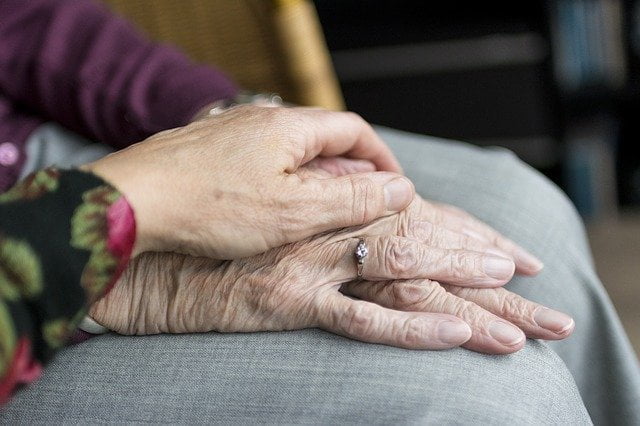
Older person holding the hand of a younger person at a drug and alcohol rehab in East Yorkshire
It is also worth exploring professionally developed methods for conducting interventions, such as the Community Reinforcement And Family Training (CRAFT) method.
CRAFT was specifically developed to help families successfully organise an intervention for people who refuse to seek help for their substance use. It also helps families cope with the negative impacts of addiction.
Families will be taught by an intervention expert how to communicate with their loved ones and how to encourage them to make positive behaviour changes.
CRAFT focuses on several important aspects of interventions, such as:
- The reason why their loved one is using the substance
- Positive communication
- How to listen empathetically
- How treatment works and how family members can support a loved one through it
- Setting and maintaining boundaries
- Understanding triggers of addiction
Learn more about CRAFT and how it can help your loved one access drug and alcohol rehab treatment in East Yorkshire by calling us today on 0800 140 4690
What Drug and Alcohol Rehab Treatment Services are Available in East Yorkshire?

Recovery group talking and making notes at a drug and alcohol rehab centre in East Yorkshire
There are many free services available for those suffering from drug or alcohol addiction in East Yorkshire.
The East Riding Partnership (ERP) runs free drug and alcohol services based in East Yorkshire. It offers support for those suffering from addiction, care workers, and family members.
Services they provide include:
- Drop-in appointments
- Advice and information regarding addiction and substance use
- Needle exchange
- Assessment and referral
- Brief interventions
- Counselling
- Motivational Interviewing
Access to the ERP’s services is via self-referral. People can visit one of their centres and speak with an adviser. [4]
Get the support you need to overcome addiction in East Yorkshire by calling us today on 0800 140 4690
NHS vs Private Drug and Alcohol Rehab in East Yorkshire

Living area at a residential drug and alcohol rehab in East Yorkshire
Addiction is not considered a ‘choice’ or ‘moral failing’ on behalf of the addiction sufferer – so the focus of rehab is always on returning agency to the patient.
For those seeking residential rehab treatment, there are two options: NHS and private.
The NHS does not have its own rehab facility. Instead, what they offer, is funding to pay for private rehab.
Unfortunately, this funding is not easy to obtain. There is a strict criterion that people must meet, such as proving that they are willing to change and deserve a place in rehab.
Funding also requires a lengthy application via a GP or key worker.
In addition, there are some important downsides to seeking rehab through the NHS. These include:
- Long wait times – usually six months to a year.
- You may have to detox or reduce substance intake before entering rehab.
- You will be expected to have attended local services, group sessions, and rehab counselling as evidence of your willingness to change.
- You might need to attend a pre-rehab course.
- There is no guarantee that even if you meet the criteria for funding that funding will be available – it will depend upon the council’s available funds.
For help choosing between private and public addiction treatment services in East Yorkshire, give our team a call on 0800 140 4690
How Much Does Private Drug and Alcohol Rehab in East Yorkshire Cost?

Pile of paper money and coins
If funding is not an issue, there are many private rehab facilities in East Yorkshire. On average, private rehab is likely to cost between £300 to £500 per day or roughly £9,000 to £15,000 per month.
However, this will depend upon the facility and the type of rehab treatment program the person enters.
It is worth mentioning that many UK-based health insurance providers cover the cost of rehab. Although this will incur a monthly fee, it is much cheaper than paying for private rehab outright.
To discover how much your time at a drug and alcohol rehab in East Yorkshire is likely to cost, give our team a call today on 0800 140 4690
How Long Does Drug and Alcohol Rehab Last in East Yorkshire?
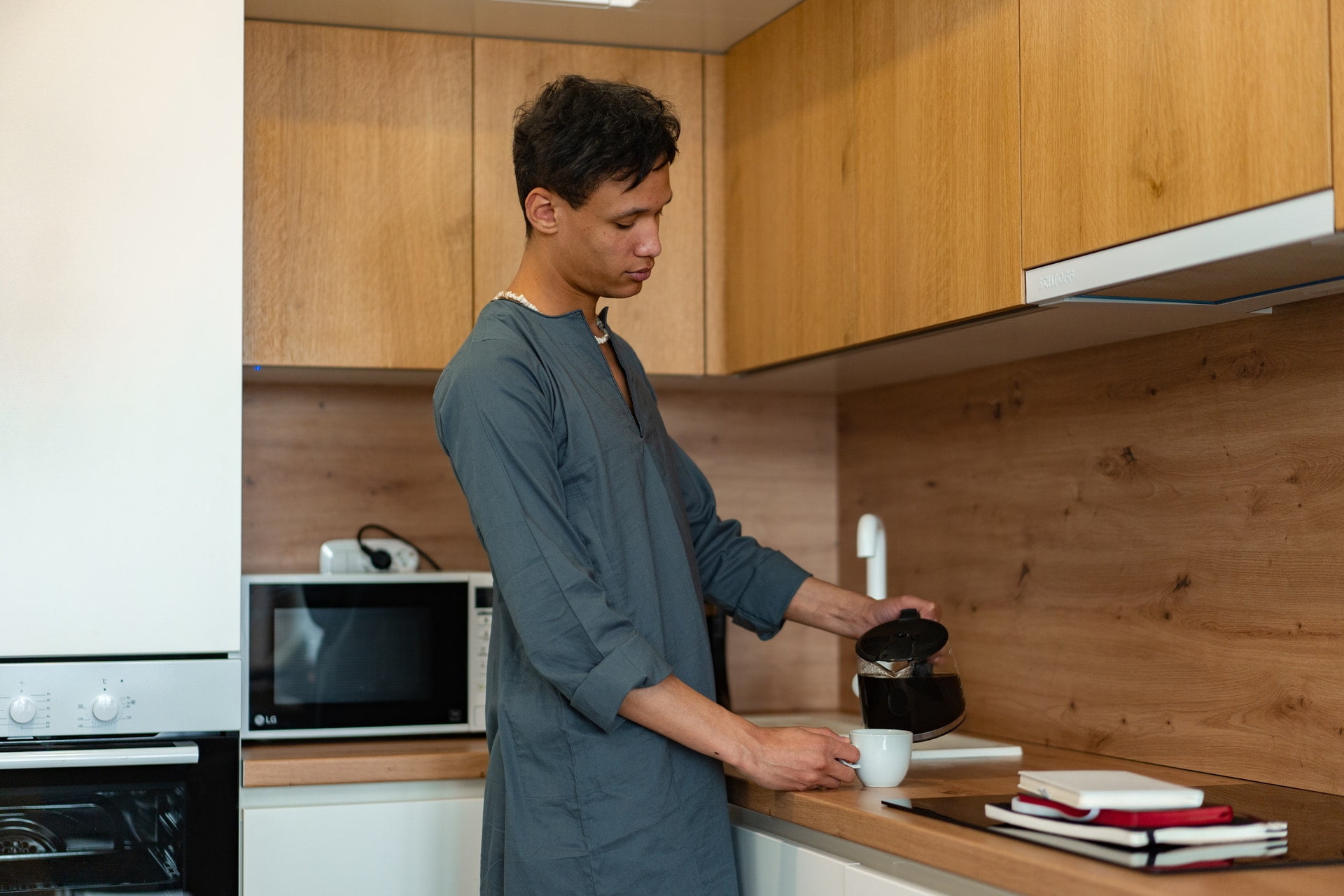
Person making coffee in the kitchen of a residential drug and alcohol rehab clinic in East Yorkshire
The duration of rehab is variable and dependent upon the treatment that the facility offers and the person’s needs.
Typically, people can expect to stay in rehab anywhere from one week to 90 days.
- Seven-day rehab is mostly aimed at those with a mild addiction or those at risk of relapse.
- Fourteen-day rehab is better suited for people with a mild to moderate addiction or people who simply wish to go through the detox stage.
- Twenty-eight-day rehab is considered by experts the minimum that people should stay in rehab when their addiction is serious. This will provide people with the opportunity to detox and receive counselling and rehab therapy.
- Ninety-day rehab is aimed mostly at people with severe addiction. This is because their alcohol or drug detox stage might take longer, and there will probably be a need for more therapy.
To learn how long your stay at a drug and alcohol rehab in East Yorkshire is likely to last, call our expert team today on 0800 140 4690
Factors That Will Affect The Length Of Your Rehab Stay in East Yorkshire

Man holding his head outside at a drug and alcohol rehab in East Yorkshire
- How long the person has been using
- The substance being treated
- If the person has other medical issues, such as mental health issues or a heart condition
- Age, gender, and weight are also taken into consideration
These are simply guidelines, however, and each person will be evaluated on their individual needs.
This is done via a pre-admission interview with a staff member at the facility.
For a more accurate prediction of the length of your rehabilitation programme, talk to our experts on 0800 140 4690
Inpatient vs Outpatient Drug and Alcohol Rehab Treatment in East Yorkshire
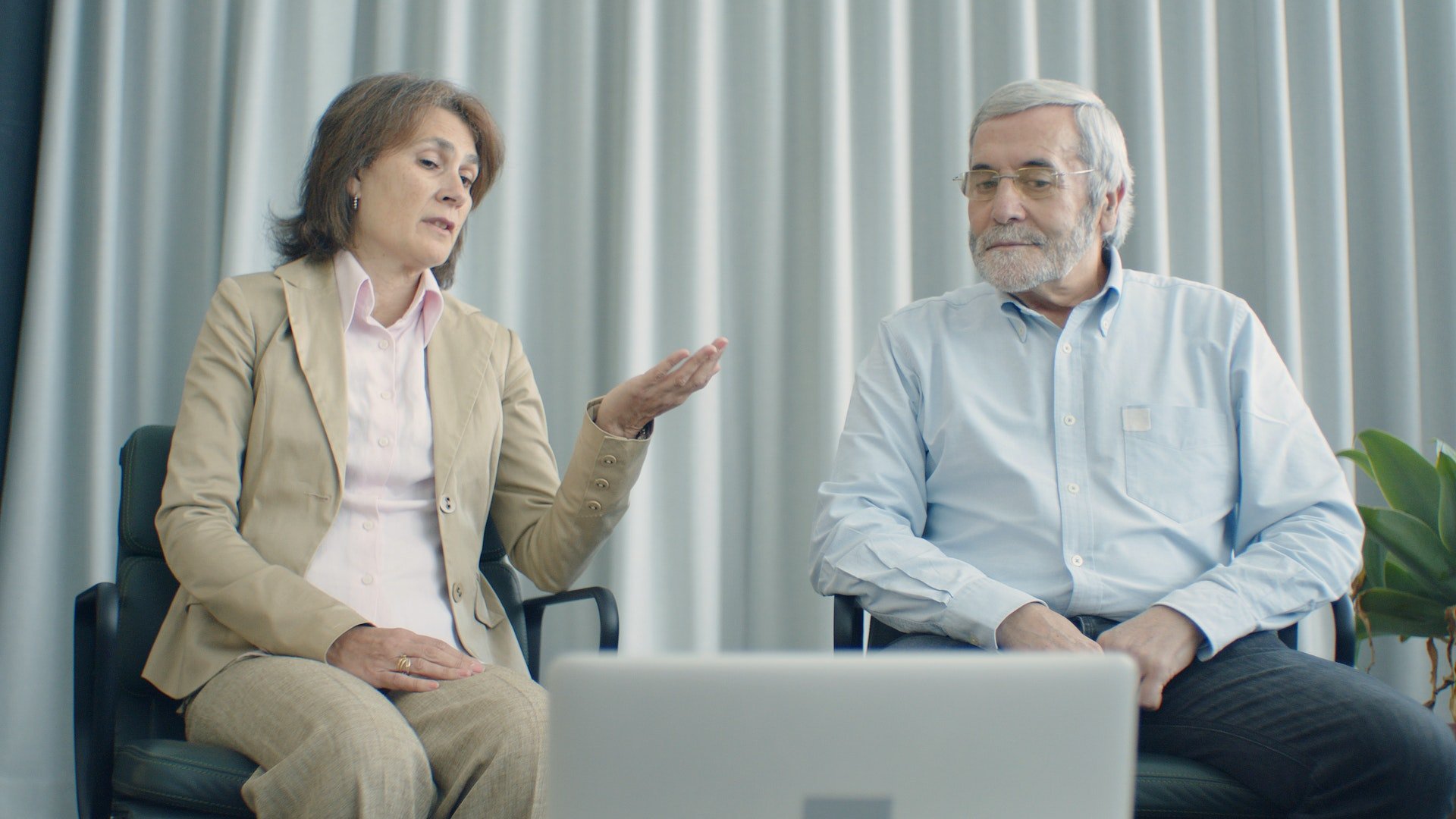
Two older people looking at a laptop in a drug and alcohol rehab in East Yorkshire
Inpatient rehab treatment, or residential rehab treatment, refers to treatment that requires people to stay overnight at a facility.
Outpatient rehab treatment, or ambulatory care, can be provided via a doctor’s surgery, clinic, or hospital and does not require the person the stay overnight.
Both inpatient and outpatient rehab treatment offer similar programs – they help people detox, offer medical assistance, provide addiction counselling, therapy, and aftercare.
Whether the person requires inpatient or outpatient treatment is largely decided by medical professionals.
Some factors that might be considered are the severity of the addiction, the substance to be treated, and how long the person has been using.
For example, someone with a serious heroin or alcohol addiction is more likely to be recommended inpatient rehab treatment.
Outpatient treatment is often better suited to people with comparatively less serious addiction or people that have other engagements, such as work.
In most cases, inpatient treatment lasts for 28 days, whereas outpatient rehab treatment can last a lot longer.
There are also cost differences. As mentioned above, inpatient treatment can be expensive.
Outpatient treatment can often be accessed for free via local services in East Yorkshire.
The downside to this is the outpatient treatment does not remove the person from potential triggers. [5]
For guidance choosing between inpatient and outpatient rehab in East Yorkshire, talk to us today on 0800 140 4690
Alcohol Detox and Alcohol Rehab in East Yorkshire
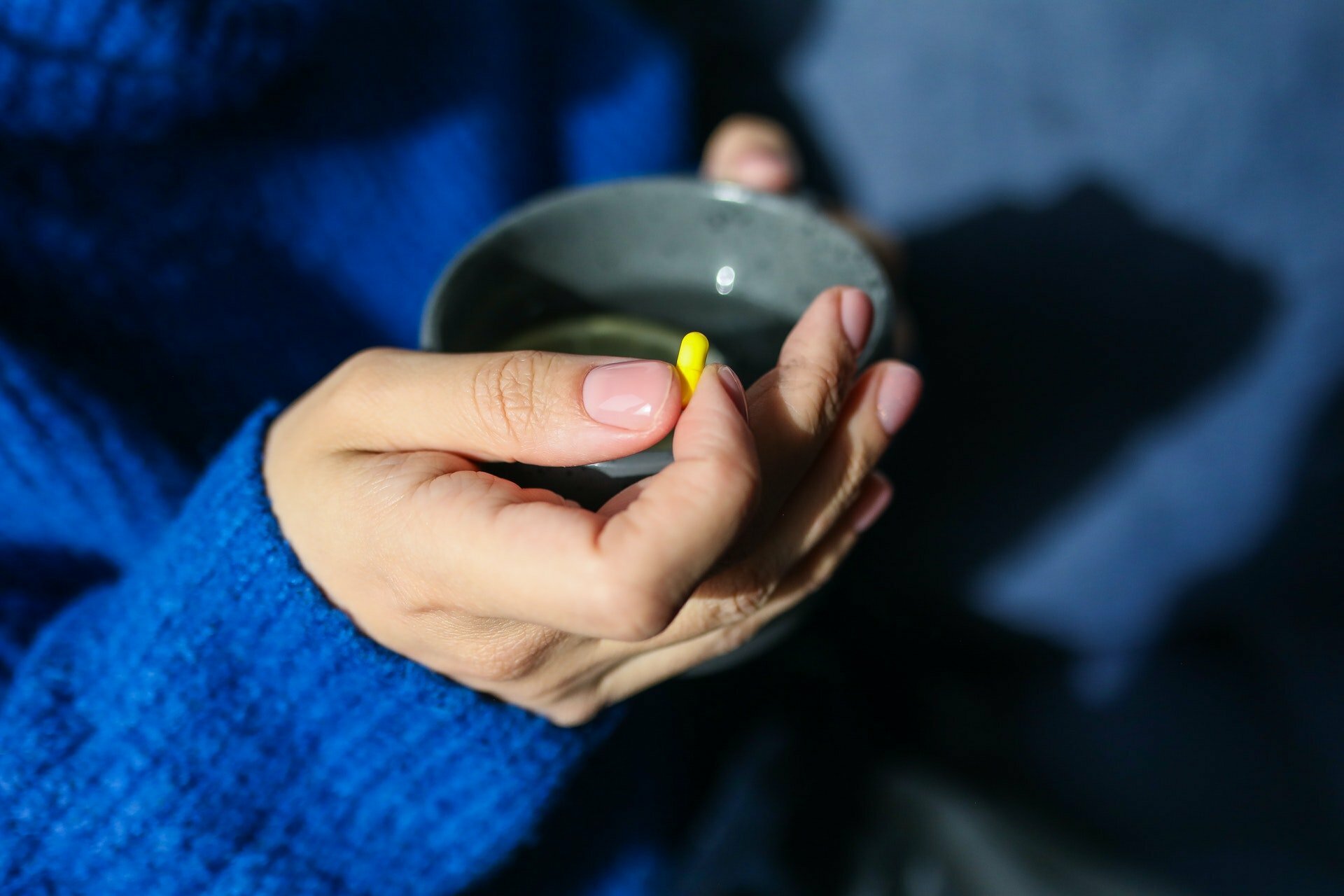
Patient taking medicine at a drug and alcohol rehab in East Yorkshire
The first stage of rehab in any facility is a medical examination. This will help medical staff uncover any psychological or physical issues and inform them of any necessary treatment.
Following this, people will enter the detox and withdrawal stage. Alcohol withdrawal symptoms are known as Alcohol Withdrawal Syndrome (AWS)
Alcohol Withdrawal Syndrome

Woman holding her knees at a drug and alcohol rehab in East Yorkshire
AWS ranges from mild to severe and can be life-threatening.
Mild to moderate symptoms include:
- Insomnia
- Shakes (tremors)
- Nausea
- Sweating
- Vomiting
- Headaches
Severe symptoms include:
- Delirium tremens
- Severe disorientation
- Increased heart rate
- High blood pressure
- Breathing issues
- Seizures
- Wernicke’s Encephalopathy
People are likely to be given prescription drugs to help counteract AWS. One of the most popular is the prescription drug Librium.
Librium alleviates AWS symptoms such as restlessness, insomnia, decreased appetite, and anxiety.
Make sure that your alcohol detox is safe and effective with the help of an alcohol and drug rehab in East Yorshire – give our team a call today on 0800 140 4690
Cannabis Rehab, Cocaine Rehab and Heroin Rehab in East Yorkshire

Doctor checking a clipboard at a drug and alcohol rehab in East Yorkshire
The detox and withdrawal stage varies from substance to substance. Cannabis withdrawal, for example, is not severe and, although unpleasant, relatively mild.
Cannabis is not physically addictive, so cannabis detox is not necessary.
Withdrawal symptoms include agitation, restlessness, a lack of appetite, stress, and anxiety.
A study by Wayne Hall and Louisa Degenhardt detailed the adverse side effects of regular use of cannabis during adolescence and into adulthood can include ‘a dependence syndrome, increased risk of motor vehicle crashes, impaired respiratory function, cardiovascular disease, and adverse effects of regular use on adolescent psychosocial development and mental health’.
Such symptoms can occur several hours after a person stops using cannabis but will most likely occur after several days. These can last between seven-to-ten days in cases of severe cannabis addiction.
Cocaine withdrawal is usually more psychological than physical. Symptoms include paranoia, anxiety, depression, irritability, and restlessness.
Symptoms can occur very quickly after a person stops using – sometimes as quickly as an hour after the final dose when the cocaine addiction is severe. Symptoms can last up to ten days.
Cocaine detox is not necessary as, like cannabis, neither cocaine nor crack cocaine is not physically addictive.
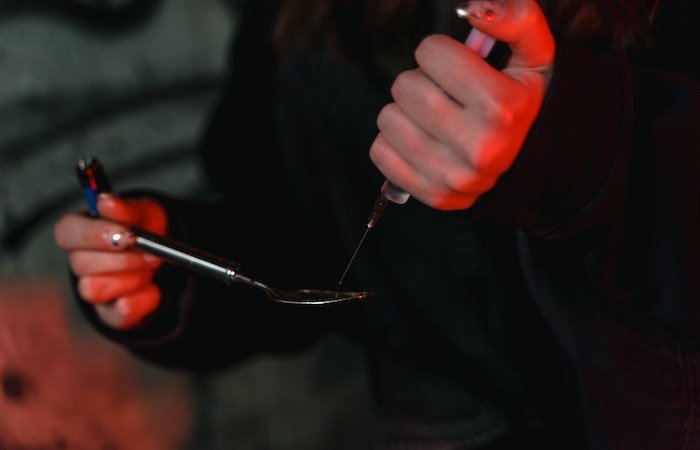
Person extracting heroin from a spoon with a needle
Heroin withdrawal is often very unpleasant due to it being a very addictive substance. Symptoms range from mild – sweats, vomiting, and muscle aches – to severe – hypertension, insomnia, breathing issues, and increased heart rate.
Such symptoms usually begin to emerge six to twelve hours after the final dose and can last up to 10 days when the heroin addiction is severe.
Because severe symptoms can be life-threatening, most people will be prescribed Methadone, Buprenorphine, or Suboxone during their heroin detox in order to help them come off heroin gradually.
Whatever manner of addiction you are suffering from, get help from a drug and alcohol rehab in East Yorkshire by calling us today on 0800 140 4690
Dual Diagnosis at Drug and Alcohol Rehab in East Yorkshire

Woman sat back to back with her reflection
Dual diagnosis – also known as dual pathology or co-occurring disorders – is a condition where people suffer from mental health issues and addiction.
Both mental health issues and addiction affect each other in various ways.
As recent reach has found:
- 50% of people with mental health issues are affected by substance abuse
- 37% of people with alcohol addiction and 53% of people with drug addiction have mental health issues
- 29% of all people diagnosed with mental health issues use drugs and/or alcohol
The reason that such statistics exist is that substances and mental health tend to go together.
For example, people who suffer from anxiety or depression will use a substance to help alleviate symptoms associated with those mental health issues. As a result, the risk of addiction is increased.
Substances such as alcohol, heroin, cocaine, and cannabis have all increased a person’s likelihood of mental health issues.
Dual diagnosis is an important consideration for most rehabs and will be addressed during detox and therapy. [7]
To learn more about how a rehab clinic in East Yorkshire will work to support your mental health, call us today on 0800 140 4690
What Therapy Will I Receive at a Drug and Alcohol Rehab in East Yorkshire?

Therapist looking straight forward at a drug and alcohol rehab in East Yorkshire
Therapy that people will receive during rehab includes:
- Individual therapy
- Cognitive Behavioural Therapy (CBT)
- Dialectical Behavioural Therapy (DBT)
- Motivational Interviewing (MI)
- Motivational Enhancement Therapy (MET)
- Brief Interventions
- Holistic therapy (Art therapy, music therapy, mindfulness, meditation, acupuncture, nutritional counselling, etc.)
- Group therapy
Cognitive Behavioural Therapy

Younger patient talking to a therapist at a drug and alcohol rehab clinic in East Yorkshire
CBT addresses the connection between thoughts and behaviour. Studies have found that negative thoughts often lead to negative behaviour, such as substance abuse. [8]
Therefore, CBT aims to help people positively reframe their thoughts to engender positive behaviour, such as sobriety.
Dialectical Behavioural Therapy
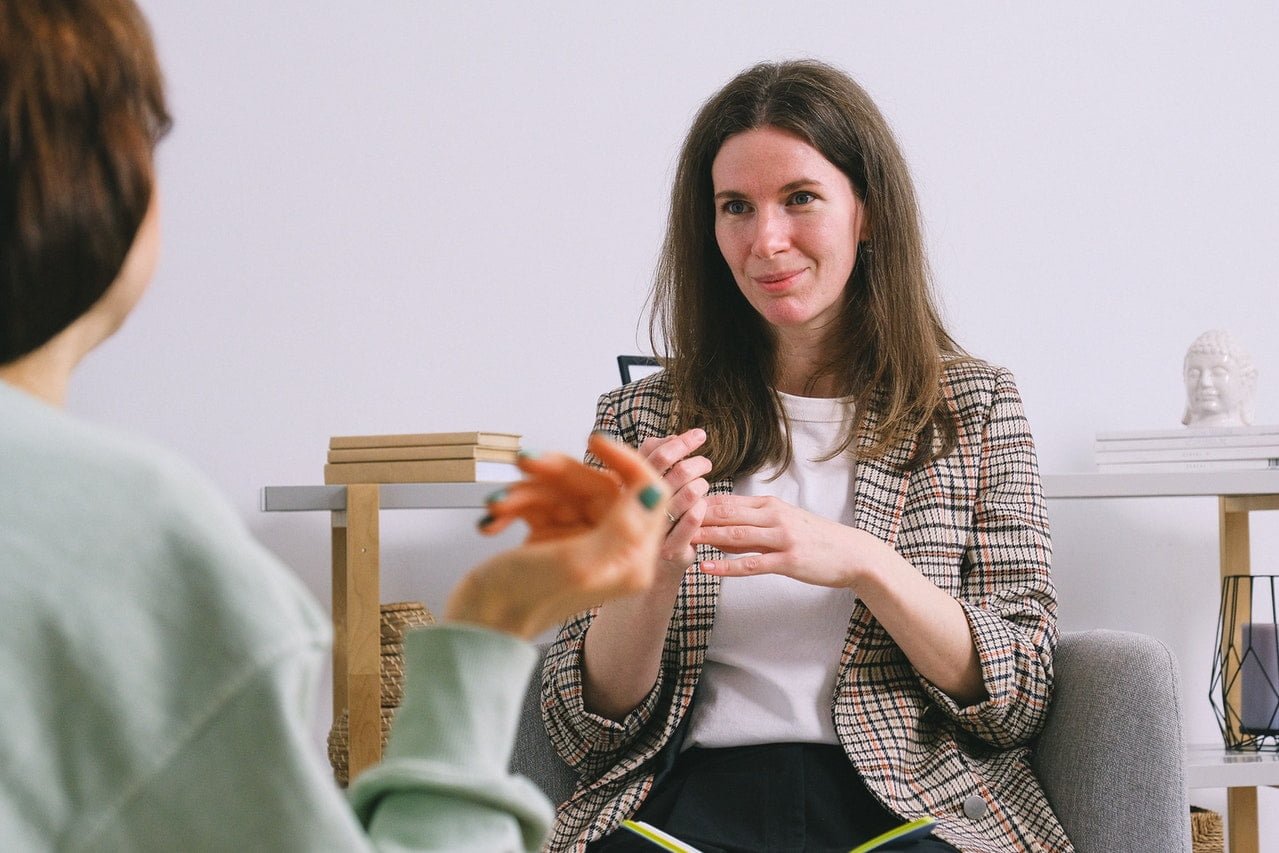
Therapist and patient speaking at a drug and alcohol rehab in East Yorkshire
DBT adheres to the same theory as CBT but focuses more on emotions and behaviour.
During DBT, people will learn how their emotions lead to certain behaviours and how such emotions can be managed.
Motivational Interviewing
MI seeks to explore a person’s motivations, such as their motivations for using a substance. Then, the goal is to help change these motivations through communication (interviews).
This often comes alongside Motivational Enhancement Thera[y (MET) to further build up the drive to recover.
Holistic and Alternative Therapies

Person painting during art therapy at a drug and alcohol rehab centre in East Yorkshire
Holistic therapy is less analytical than the aforementioned therapies and focuses on helping people obtain a sense of wellness.
This is achieved by getting the person to engage in activities such as painting, gardening, yoga, or meditation.
Group Therapy
Group therapy involves peers meeting to talk about their experiences of addiction and rehabilitation. In addition, it offers the chance for people that are going through similar experiences to connect.
To experience any and all of these superb therapies at one of the many rehab clinics in East Yorkshire, call us today on 0800 140 4690
Relapse Prevention and Aftercare After Drug and Alcohol Rehab in East Yorkshire

Support group putting their hands together at a drug and alcohol rehab centre in East Yorkshire
During rehab, people will begin to develop a relapse prevention plan. This is aimed at preventing them from engaging in unhealthy behaviours when entering their usual environment.
Experts have agreed that abstinence is far more effective than harm reduction or moderation management.
A relapse prevention plan is a useful course of action should the person begin to struggle and/or feel tempted to use a substance.
Relapse prevention plans are usually developed with the help of a medical professional. It will focus on potential triggers, such as people, relationships, or social settings. [9]
A relapse prevention plan will usually include:
- An overview of the person’s drug history
- Signs that relapse could happen
- An action plan – how to act in certain situations and environments
Relapse does not usually occur quickly – it is often a process of emotional, mental, and then physical relapse.
A relapse prevention plan is aimed at providing tools to deal with each of these stages, such as emotional management, better communication, and how to seek out support.
Rehab will also offer aftercare; this is part of relapse prevention and includes continued counselling and therapy.
Other aftercare services include Alcoholics Anonymous (AA), Narcotics Anonymous (NA), and SMART recovery.
These organisations are available in East Yorkshire and offer therapy such as CBT, Motivational Interviewing, and peer-support groups.
Make sure that your stay at a drug and alcohol rehab in East Yorkshire is matched by an equally effective aftercare plan by calling us today on 0800 140 4690
Alternative Help for Drug and Alcohol Addiction in East Yorkshire

Therapy group taking notes at a drug and alcohol rehab in East Yorkshire
To receive free or reduced-cost rehab support for drug or alcohol addiction in East Yorkshire, consider the following organisations:
1. East Riding Partnership
Address: 100 Boothferry Rd, Goole DN14 6AE
Telephone: 01405 608 210
Website: http://www.humber.nhs.uk/services/east-riding-partnership.htm
2. ReNew
Address: Trafalgar House, 43-45 Beverley Rd, Hull HU3 1XH
Telephone: 01482 620 013
Website: https://www.changegrowlive.org/hull-renew
3. Changing Lives
Telephone: 01904 621 776
Website: https://www.changing-lives.org.uk/
For mental health support to keep your mind in a good place, reach out Samaritans, Young Minds, Papyrus, and Rethink Mental Illness as you navigate your addiction and your new life in recovery.
Reach Out For Help Choosing a Drug and Alcohol Rehab in East Yorkshire

Person typing on their phone at a drug and alcohol rehab in East Yorkshire
If drugs or alcohol are causing you to lose control over your life, please call us on the number below, or use our live chat service.
There are many people and resources available to support you, and we can help you decide if private rehab is for you.
Choosing a rehab blindly may mean entering a program that is not ideal for your requirements. The problem is that most people will not be aware of their options for alcohol or drug addiction treatment services, and this means that they will struggle to find the most appropriate one – this is not the type of decision you want to leave to luck.
Our team is expert in regards to what rehabs have to offer – we will be able to offer you advice on your best options right around the UK.
These days many people are deciding to go beyond East Yorkshire for addiction help, and this may be something that you want to consider as well.
If you contact us now we will help you find something appropriate, and once you have reached your decision we can then make the arrangements for you.
We have many rehabs in East Yorkshire, available in Beverley, Bridlington, Driffield, Kingston upon Hull, Hornsea, Pocklington, Withernsea, Goole, Flamborough, Hutton Cranswick, Bishop Burton, Cherry Burton, Burstwick, Barmston, Foston on the Wolds, Everingham, Bellasize, Aike, Buckton Snaith, Warter, Market Weighton, Hedon, Brantingham, Huggate, Cottam, Patrington, Howden, Brandesburton, Elloughton, Burton Agnes, North Ferriby, Skipsea, Thorngumbald, Hessle, Holme-on-Spalding-Moor, Easington, Sewerby, Burton Fleming, Mappleton, Walkington, Dunswell, Fitling, Goodmanham, Sledmere, Londesborough, Waxholme, and Octon.
The centres we recommend all come regulated and approved by The Care Quality Commission (England and Wales) or the Care Inspectorate (Scotland).
When you get in touch with our addiction specialists, we can offer you free advice, and referrals to rehab in your chosen area. Many of our employees are in recovery, and have first-hand experience with what you’re going through.
For more information about rehab in East Yorkshire, contact Rehab Recovery on 0800 088 66 86.
References
[2] Kranzler, Henry R., and Michael Soyka. “Diagnosis and pharmacotherapy of alcohol use disorder: a review.” Jama 320, no. 8 (2018): 815-824. Accessible here: https://www.ncbi.nlm.nih.gov/pmc/articles/PMC7391072/
[3] Copello, Alex G., Lorna Templeton, and Richard Velleman. “Family interventions for drug and alcohol misuse: is there a best practice?.” Current opinion in psychiatry 19, no. 3 (2006): 271-276. Accessible here: https://pubmed.ncbi.nlm.nih.gov/16612212/
[4] https://www.humber.nhs.uk/services/east-riding-partnership.htm
[7] https://www.dartmouth.edu/eap/library/dualdiagnosis1.pdf
[8] https://www.ncbi.nlm.nih.gov/books/NBK279297/
[9] https://www.ncbi.nlm.nih.gov/books/NBK551500/


